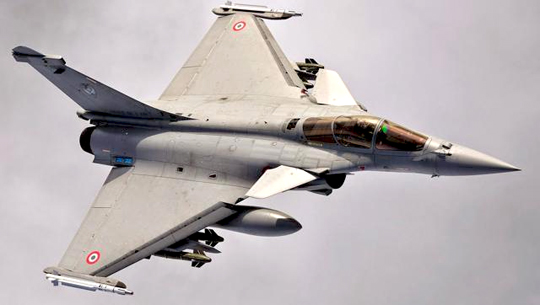New Delhi, Jan 26: India signed an inter-governmental pact on Monday to buy 36 French-built Rafale fighter planes, but the leaders of both countries said there was still work to do to finalise financial terms after months of talks.
The deal, worth an estimated $9 billion, was to have been the centrepiece of a visit to India by French President Francois Hollande, invited as guest of honour for Tuesday’s Republic Day parade.
But Hollande and his host, Narendra Modi, both said further talks were needed to finalise the terms of the deal, which the Indian prime minister had announced when he visited France last spring.
Hollande described the deal on Rafale as “a decisive step”, adding: “There remain financial issues which will be sorted out in a couple of days.”
However, Dassault Aviation, the aircraft-maker, said in a statement it expected a complete agreement on the planes in four weeks’ time.
Both leaders played up their interest in cooperating in the fight against international militant groups, with Hollande saying France and its allies would strike “again and again” against Islamic State.
“ISIS is provoking us in the worst possible way,” Hollande said, using an acronym for Islamic State, which controls parts of Syria and Iraq, and was behind several attacks on Paris in November that killed 130 people.
ARMS DEAL
Hollande and Modi stepped into the Rafale deal last year, ordering government-to-government talks after commercial negotiations with Dassault had collapsed.
The leaders agreed to scale back the original plan for 126 Rafale planes to just 36 in flyaway condition, to meet the Indian Air Force’s urgent needs, as it faces an assertive China and long-time foe Pakistan.
The fighter deal is part of a $150-billion military overhaul India has launched, drawing global arms makers into one of the world’s biggest markets.
“France is a special friend. Eighteen years ago, France was the first country we signed a strategic partnership with. We are now here to take it higher,” Modi told a joint news conference after his talks with Hollande.
In other business, France’s Alstom signed a pact with Indian Railways to make 800 locomotives in India, a boost for Modi’s drive to build a domestic industrial base and provide jobs to a growing workforce.
Hollande said an agreement for France’s Areva to build six nuclear reactors in India should be concluded within a year. The two sides have been wrangling over the price of power from these units for more than a year.
Hollande and Modi have agreed to hasten the nuclear talks and aim for construction to begin in early 2017, they said in a joint statement.
“From nuclear cooperation to railway locomotives, we are sowing the seeds of an ever-tightening web of cooperation between our two countries, “ Modi said.
French companies will invest $10 billion in India over the next five years, chiefly in the industrial sector, Finance Minister Michel Sapin said earlier in New Delhi.







Comments
Add new comment